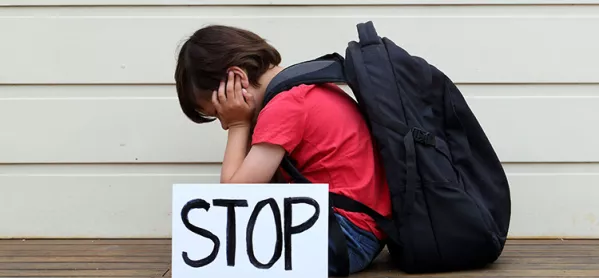Large numbers of teachers are so concerned about bullying in the school they teach in that they would not be happy to send their own child there, a joint survey by Tes and ITV’s This Morning survey has found.
The poll of more than 1,000 teachers found that nearly a quarter (23 per cent) of those in secondaries and 12 per cent of primary teachers thought that bullying was such a severe issue where they worked that they would not be prepared to risk their own children’s wellbeing.
And worryingly, more than a fifth of all teachers (22 per cent) said that bullying in their school was on the increase.
“I would strongly urge anybody in my family or my friends not to send them to my school,” said one secondary teacher in the North East. “I wouldn’t have my children come in.”
“I think there’s a bit of a general tendency for schools to not want to accept and not recognise how much of a problem bullying is, lest it be a black mark against them. It doesn’t lead to exclusions, Heaven forbid, because it would reflect on the school. It allows the bullies to continue operating.”
‘It got to the point where he was physically sick’
Another teacher revealed how they had to eventually take their son out of an “outstanding” secondary because of its failure to deal with bullying.
“The bullying started in primary school - another allegedly ‘outstanding’ school,” they said. “It was mainly name-calling but some of it was homophobic. It got to the point where he was being sick on the school bus. Actually sick.”
More than half of secondary teachers (51.6 per cent) and just over a fifth of primary teachers (22 per cent) said that bullying was a problem in their school, the online poll of 1,017 teachers found.
And the situation in some schools was so bad that children were too frightened to turn up. Two-fifths (40 per cent) of teachers said they knew of pupils too scared to attend school because of bullying.
Cyberbullying was seen as a particular problem, with 76 per cent of teachers saying that digital technology was making bullying worse, even in primaries (64 per cent).
Steve Manderson, assistant headteacher at the Trinity Catholic School in Nottingham, said: “Bullying has moved from what you would see in The Simpsons - the knucklehead shaking down kids in the yard for their lunch money. Now it’s psychological. The physical bullying has just migrated across to online bullying.
“The problem is that kids can’t get away from it, it’s very difficult to avoid. They almost feel a compulsion to carry on the conversation, to defend themselves, to say the next bit.
“You sometimes see children who don’t want to come to school because they anticipate the bullying carrying on. The persistent nature of it makes it seem much worse.”
But 51 per cent of teachers in the survey said they had not had the training they needed to combat bullying.
Ann Mroz, editor of Tes, said: “Bullying is a problem that affects all areas of society and something that teachers have to work particularly hard to tackle in schools. The results of this Tes and This Morning survey demonstrate just how demanding that job is.
“It also shows how much the advent of digital technology has exacerbated the problem and taken it into pupils’ homes. Combating bullying cannot be left to schools alone.
“Teachers need the support of parents, the government and wider society in helping to ensure that every pupil feels happy, content and loved during their time at school.”
A Department for Education spokesperson said: “Bullying of any kind is unacceptable. Schools should be safe places where children are taught to tolerate and respect others.
“To help support this, the government is investing more than £4 million in anti-bullying projects. This includes the Diana Award to extend the peer-to-peer Anti-Bullying Ambassadors Programme to a further 4,000 young people.
“We have also funded advice for schools on understanding, preventing and responding to cyberbullying, along with an online safety toolkit for use in PSHE lessons.”
Want to keep up with the latest education news and opinion? Follow Tes on Twitter and like Tes on Facebook




